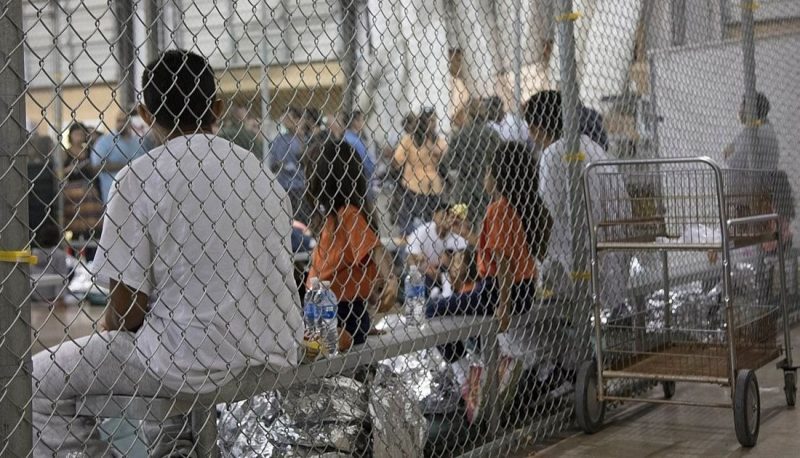Trump’s zero-tolerance immigration policy has ripped thousands of immigrant families apart with no guarantee of being reunited. Although Trump claimed to have officially ended his policy more than a year ago, we recently learned that more than 900 children have been separated from their families since then. And just this week, ICE raided a Mississippi food processing plant and rounded up 680 more Latino workers, separating even more families.
It’s hard to overstate the damage these attacks cause to immigrant families. Children are taken away from any sense of comfort and familiarity, and placed in abhorrent detention facilities for lengthy periods of time where they are stripped of their personal belongings, and forced to sleep on cold concrete floors.
These facilities are sites of cruelty and chaos for children: they don’t provide basic needs like diapers, toothbrushes, or showers. They do not receive adequate medical care. In short, they are starving, filthy, and traumatized.
Immigration officials claim that these detention centers were intended for short-term housing until the child could be placed elsewhere. Unfortunately, many children end up spending months on end in these appalling facilities, which are also a breeding ground for disease and infection.
Not only is this an unacceptable violation of human rights, it has severe consequences for a child’s neurological and psychological development that endure for the rest of their lives. As a cognitive science major at UC Santa Barbara, I have learned about how trauma early on can set off a devastating chain reaction of events that can last a lifetime.
The bond a child forms with their parent is something that should never be forcibly broken. Immigrant children feel helpless and afraid when their families are torn apart. Such immediate isolation causes child trauma, which triggers the brain to release stress hormones that initiate a ‘fight, flight, or freeze’ response in order to survive. This, in turn, temporarily inhibits the part of the brain responsible for rational thinking and causes the child to act in purely emotional ways like crying and screaming.
This response can be minimized if the child is placed into a healthy environment post- trauma, but immigrant children are instead put in detention centers, which only exacerbates the neurological stress response. Emotion continues to override reason, which results in toxic stress that weakens pathways in the brain and alters them in dangerous and profound ways. This can have lasting consequences for immigrant children and can result in severe developmental and mood disorders.
In addition to those neurological changes, immigrant children are subject to immense psychological repercussions as a result of being separated from their families in a foreign country without any sense of familiarity or stability. It is difficult for a child to comprehend why their caregiver has suddenly disappeared and is showing no signs of return. While the behaviors and beliefs that result from trauma are subjective, there is a general pattern that can occur after such separation. First, they struggle to process what has happened as they desperately try to find their caregiver to no avail. Then, they enter a state of despair and withdraw from their environment. Finally, they become detached and submit to the reality of the separation.
The debilitating effects of detachment are pervasive and remain even after immigrant children are reunited. There have been several instances of children not showing any emotion after seeing their parents for the first time in months. One toddler even tried to crawl away from his mother while she was trying to pick her up. A natural response to trauma is dissociating as a means of protection and the lack of emotion is just that. The children have been exposed to trauma for such a lengthy period of time that it has completely altered their sense of reality and has stunted their emotional development. When children are abandoned, they tend to blame themselves and develop damaging thought patterns that skew their perception of what a healthy relationship is.
The ‘no touch’ rules in detention centers that deprive immigrant children of necessary physical contact and comfort further worsens children’s trauma. Touch often conveys more emotion than words, especially at a young age, and it is crucial for a young child to associate touch with human empathy. Without adequate sensory stimulation from others, these children are at increased risk for impaired cognitive development and attachment disorders. When a child’s nurturing is disrupted so abruptly, their ability for social interaction is stunted, and they start to internalize feelings of self-hatred.
Children are incredibly resilient and have the ability to recover from trauma, but immigrant children won’t be able to recover if they remain in such life-threatening conditions. This despicable treatment needs to stop if they are to have any hopes of doing so.
The policies that the Trump administration is carrying out are cruel, unnecessary, and harm innocent children on a daily basis. No federal agency should be able to dehumanize people in this way. Unjust deportation and family separation needs to end. Until then, children will continue to suffer needlessly and accumulate even more psychological scars.
